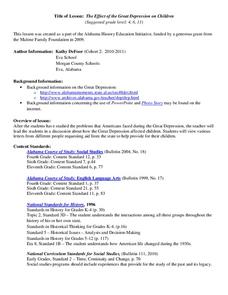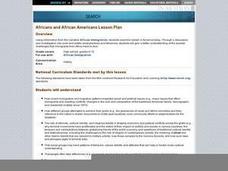Curated OER
Culture - Unit on Culture & Globalization
Students examine the spread of American culture throughout the world. They read an article, discuss items made by foreign-owned companies, complete handouts, read and discuss a case study, and conduct a role-play about a U.S.-Canada...
Curated OER
Farewell to Manzanar
Students investigate themes of justice and rights while reading the novel Farewell to Manzanar. They research contemporary civil rights issues and write reports. They also research the background of internment camps during World War II.
Curated OER
Personalities, Perspectives and Agendas
Learners debate the causes of the American Revolution. In this American history instructional activity, students conduct research to determine how bias and perspective have made their way into historical documents....
Curated OER
Donkeys and Elephants and Voters, Oh My!
Students celebrate party politics. In this American politics lesson plan, students discover what the 2 main political parties in the country are and discuss their functions. Students then participate in a classroom simulation that...
Roy Rosenzweig Center for History and New Media
Reconstruction
When slavery ended, what did the government do to help African American during Reconstruction? An interesting instructional activity uses primary sources such as newspaper articles to help scholars analyze Reconstruction policies and how...
Alabama Department of Archives and History
The Effect of the Great Depression on Children
How did the Great Depression affect children? Sometimes studying the Great Depression means only studying about how it affected adults, however, relating the experiences of children and peers their age to themselves may make the...
Curated OER
Political Campaign Ads
During a political campaign, you can hardly turn around without encountering an endorsement or attack on a candidate. High schoolers examine the ways that negative advertisement, positive advertisements, and everything in between can...
Smithsonian Institution
We Have a Story to Tell: Native Peoples of the Chesapeake Region
How did colonial settlement and the establishment of the United States affect Native Americans in the Chesapeake region? Your young historians will analyze contemporary and historical maps, read informational texts, and work in groups to...
Jamestown-Yorktown Foundation
How Did Relations between Britain and the Colonies Change after the French and Indian War?
What does the French and Indian War have to do with the American Revolution? Following the war, Britain issued the Proclamation of 1763 in an attempt to limit the colonists' western expansion. To understand how the proclamation, the...
PBS
Stereotypes vs. Statistics (Grades 9-12)
What is a common stereotype people may think about you; is it true? Using a thought-provoking lesson, high schoolers analyze common stereotypes of the Latino-American population versus statistical data. Scholars review data and...
Curated OER
AIH-8: American Indian Lifestyles
Fifth graders explain how the history of the American Indian is affecting them today.
Curated OER
Photographs of the 369th Infantry and African Americans during World War I
Learners engage in a discussion regarding images of war we see, how quickly do we see them, and how they affect us? They view and analyze war photographs taken during World War I.
Curated OER
Africans and African Americans
Students complete small group tasks related to racism as it applies to African Americans, African immigrants, and white immigrants. Through discussion of their findings, students explain of challenges in society that African immigrants...
Curated OER
Boarding Schools And Native American Culture
Students engage in a lesson that focuses on the influence of American values placed upon the Indians. Students use primary and secondary documents in order to explore the indoctrination. They create a project that reflects adequate...
Alabama Department of Archives and History
Montgomery Bus Boycott: We Would Rather Walk!
Have historians use primary sources to learn about the circumstances and implementation of the Montgomery Bus Boycott, and think about the issue of boycotts as a means of effecting social change. Wrap it up with a...
Teaching Tolerance
The War on Drugs—Mechanisms and Effects
The war on drugs doesn't have definite results. An interesting lesson examines the social, political, and economic effect of the war on drugs. Academics learn how the war on drugs has led to mass incarcerations and negatively affected...
Annenberg Foundation
America's History in the Making: Using Digital Technologies
How can digital technology of today link us to the events of the past? Scholars use technology to uncover the vast number of historical resources available in lesson 12 of a 22-part America's History in the Making series. Using databases...
Curated OER
Forced to Move in More Ways Than One
Eleventh graders explore the Native American movement. They study the Indian Removal Act of 1830, the Dawes Act of 1887, and the Indian Boarding Schools in 1887. They research each episode and create a Venn diagram poster.
Curated OER
American History: Finding your Voice
Young scholars are able to write a speech and create a slogan through analysis of current issues articles dealing with pesticide use. They put themselves in the position of one of the workers affected by the story they read.
Curated OER
The 1828 Campaign of Andrew Jackson: Issues in the Election of 1828 and Beyond
Students research the campaign and election issues of Andrew Jackson. In this presidential election activity, students research the campaign of 1828. Students then list the important issues. Students discuss the political advertisements...
Curated OER
Returning to the South
Students reinforce their knowledge of the Great Migration by reading a narrative to investigate reasons why African-Americans chose to migrate from the South. Students then write editorials for a local newspaper that outlines the reasons...
Curated OER
Government Lesson Plan: Lesson Plan 7
Learners examine the impact of Franklin Roosevelt's executive order on Japanese-Americans. They discuss Presidential executive orders, read a handout, answer discussion questions, and write a letter to President Roosevelt.
Curated OER
A World Torn by Drugs
Students explore different drug issues that have affected international relations.
Curated OER
Art: Faith Ringgold Story Quilts
Twelfth graders examine the impact of African American culture on the United States by inspecting Faith Ringgold's story quilts. Working in groups, they create a collective story quilt about current cultural issues. They research their...























